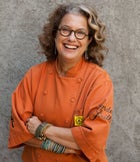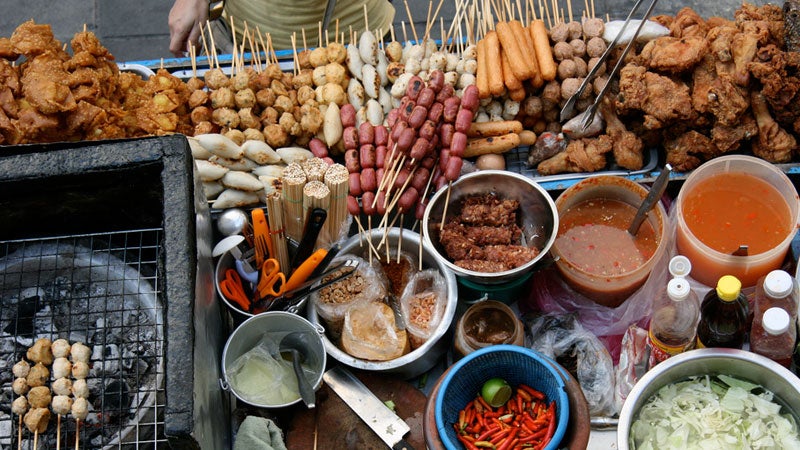The party animals over at the recommend wholesale avoidance of street food in developing countries—great advice if you hate authentic experiences (we were going to say “life,” but that seemed harsh).
 Chef Susan Feniger photographed at Mary Sue Milliken’s home in Culver City, California. The two chefs are the owners of Border Grill in Los Angeles.
Chef Susan Feniger photographed at Mary Sue Milliken’s home in Culver City, California. The two chefs are the owners of Border Grill in Los Angeles.For the rest of us, sampling a city’s food stalls, stands, shacks, carts, markets, trucks, and actual holes in walls can be an ecstatic anthropological adventure.
But before you start grabbing every chicharróne and fish ball in sight, remember that your pampered first-world stomach is ill equipped to deal with the bacteria often found in tap water and uncooked food in poor nations.
To reduce your odds of getting a bug while abroad, memorize these tips from chef and street-food evangelist Susan Feniger—co-owner of the venerable in Los Angeles and sole proprietor of , an L.A.-based brick-and-mortar joint serving dishes inspired by Feniger’s world travels.
Look for Lines
“If you go to a stand or a cart and it’s busy, that’s a great sign,” Feniger says. A long line usually signifies deliciousness and (fingers crossed) cleanliness. A long line made up of locals is even better—a sign that you’re in for a legit cultural experience.
Go Local
Find a local guide to help you to navigate and explore neighborhoods that you might never find on your own. If hiring a guide’s not your style, just ask a local for street food recommendations. We’ve had good luck hitting up hotel cleaning people for suggestions. Unlike the concierge, who often has a quid pro quo with a middling area restaurant, they’ll give you the straight story.
Paper is Better
“Ideally, you want the food to be served on paper and not plastic that’s being washed with local water,” Feniger says. Translation: You want those tacos al pastor served on disposable plates that haven’t been washed and reused. On a related note, be sure the person taking your money is not also preparing your food.
Opt for Cooked Food
Avoid raw dishes or condiments. Bacteria thrive in the 40- to 140-degree Fahrenheit range, so make sure your food has been cooked through. Make an exception for cilantro, though. Multiple studies have shown the herb to have anti-microbial properties, which could come in handy in Mexico City and Bangkok.
But lest we suck all the romance out of street food with our caveats, keep Feniger’s freewheeling mantra in mind when traveling: “Just explore and eat!”
Amen, Susan Feniger.


